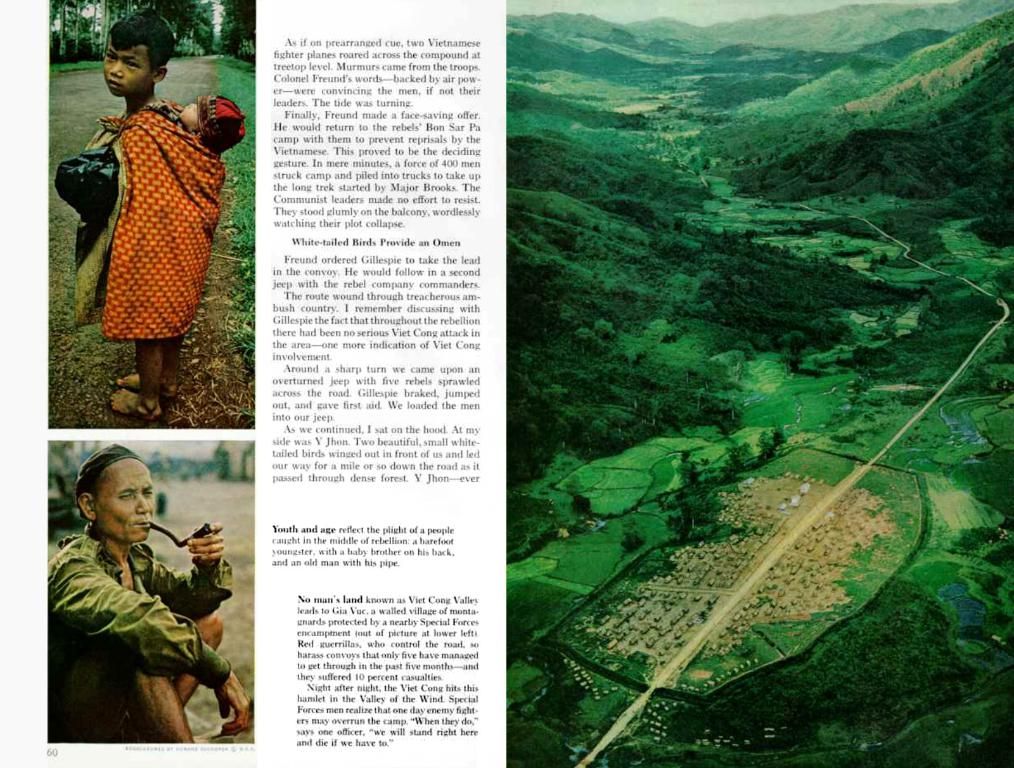France Outlaws Activist Groups as Potential Presidential Rivals Prepare for 2027 Elections
In the heat of French politics, the government is taking a hard stance against activist groups deemed extremist, raising accusations of Islamophobia and plagiarism from both ends of the political spectrum. As Emmanuel Macron prepares to exit the political stage in 2027, hopefuls jostle for position in the presidential race, using a volatile political climate to their advantage.
Interior Minister Bruno Retailleau, aiming to succeed Macron, is cracking down on various groups to show his commitment to protecting France from extremism. On the edge of this clampdown is Urgence Palestine, a collective pushing for an immediate ceasefire in Gaza, accused of Islamophobia by Retailleau. In an interview, he stated, "Islamism is an ideology that misuses religion as a tool. We must combat Islamism to shield our Muslim compatriots."
Simultaneously, Retailleau is targeting left-wing movements like the antifascist Young Guard and ultranationalist groups like Lyon Populaire. The measures come just ahead of May Day celebrations, marked by a surge in antisemitic and islamophobic incidents in Europe, raising concern among political rivals.
Leftist challenger Jean-Luc Melenchon, moved to tears while addressing a rally after an Islamophobic attack on a French mosque, accused Retailleau of nurturing "a climate of Islamophobia." On the other hand, far-right leaders worry that Retailleau's immigration policies could siphon off their voters. Accusing Retailleau of pandering to the far-right electorate, Marine Le Pen and Jordan Bardella argue that his measures are simply empty words, failing to address the issues at hand effectively.
As Retailleau gears up for the 2027 presidential election, his strategy of tackling extremism echoes former President Nicolas Sarkozy's successful approach in 2007. His firm stance on Islamism could appeal to voters as the election looms. Meanwhile, the French government remains committed to addressing the growing influence of extremist groups, particularly the Muslim Brotherhood, and to safeguarding the nation's secular values.
In recent years, concerns about the Muslim Brotherhood's entryism strategy—their covert attempts to infiltrate local politics and religious institutions—have emerged. Despite no formal ban on the organization, there is widespread public support for such action. The government has also proposed restrictions on the hijab for minors and targeting foreign clerics, with the goal of curbing Islamist extremism within France.
However, the government's approach to extremism is largely aimed at reassuring the public and addressing immediate concerns, rather than focusing solely on the upcoming election. The political discourse, policy initiatives, and public perception of the government's effectiveness could all play a crucial role in the 2027 presidential elections, as the country grapples with the complex issue of extremism and national security.
- The political debate in France, influenced by elections and general news, has intensified over the government's stance against extremist groups, with accusations of Islamophobia and plagiarism being levied against the current administration.
- Amidst this political climate, Interior Minister Bruno Retailleau, a potential presidential candidate, is using a hardline approach against various groups, including Urgence Palestine, to demonstrate his commitment to protecting France from extremism.
- Simultaneously, Retailleau is targeting left-wing and ultranationalist groups, prompting concerns about a rise in Islamophobic incidents and drawing criticism from political rivals.
- Leftist challenger Jean-Luc Melenchon has accused Retailleau of cultivating a climate of Islamophobia, while far-right leaders worry that Retailleau's immigration policies could draw votes away from them.
- The government's strategy of combating extremism, which echoes former President Nicolas Sarkozy's approach, could potentially appeal to voters as the presidential election of 2027 approaches.
- In response to concerns about extremist groups like the Muslim Brotherhood, the government has proposed restrictions on the hijab for minors, foreign clerics, and curbing Islamist extremism within France, but its approach is primarily geared towards public reassurance and addressing immediate concerns in the lead-up to the elections.








